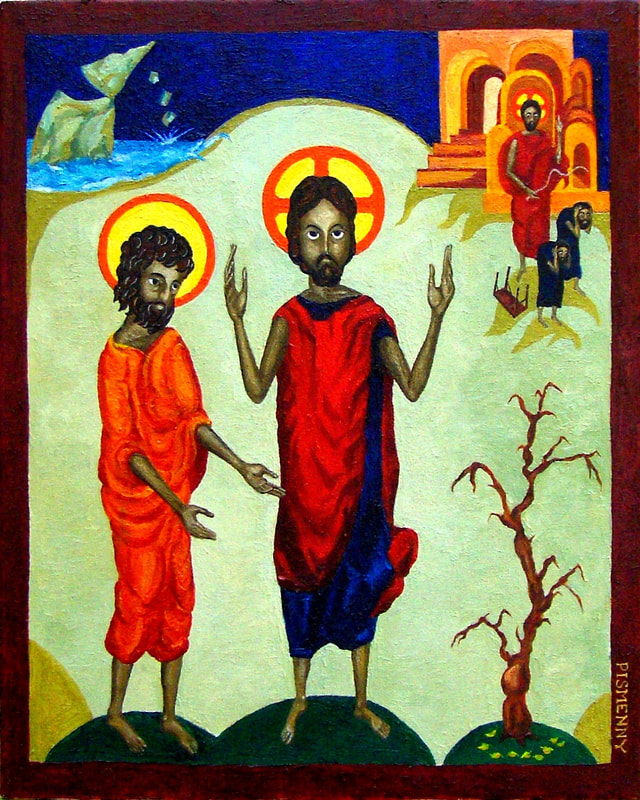Amy Courts
Written Things:
sermons, songs, etceteras
HUNGER | Matthew 21:18-223/27/2023
May we be met today as the blind men were on the road to Jerusalem, and our eyes opened; May we be filled today with food that nourishes and satisfies the hunger of our bodies, our minds, our spirits, through Jesus Christ who is all and is in all, Amen.
Good morning, Redeemer. It’s good to be with you again, last minute as it is while Pastor Jen is resting and recovering at home. I come to you frazzled and harried as my family navigates all kinds of potential changes to our lives in this first call journey. We often find ourselves with frayed nerves, doing our best to stay in the moment, but often failing. So this story about a cursed fig tree hits close to home. Which is funny, because on first read, it just seems weird, random, and out of place. In fact, when I saw this was today’s text I audibly sighed and sent an “oh no” text to Pastor Jen. It is -- no lie -- a passage that we joked about in Seminary. No one wants to preach about it because it’s like squeezing blood from a stone -- or like pulling figs from a tree that’s not yet in season to produce fruit. Not only that, but when I searched for wisdom from my go-to preacher's, like Dr Wil Gafney, Rev. Otis Moss, and Rev Traci Blackmon, they were quiet. It seems none of the progressive, womanist, or liberationist voices I follow find this passage particularly remarkable. Old conservative white men, on the other hand, have lots to say, mostly about judgment and performance and how we can tell “real” christians from fake ones who “bear leaves” but not fruit and whom, therefore, God will doom to everlasting withering, and while that’s all very interesting, it’s actually not. Not to me, anyway, and not today.
0 Comments
How Long | Matthew 22:1-143/8/2023
This sermon was originally preached on March 8, 2023 at Augsburg University.
Scripture Texts: Jeremiah 6:13-20; 7:3-11 | Matthew 22:1-14
Good morning, Beloveds. Thank you, Pastors Hannah and Babette, for inviting me to be here today, and for your lovely introduction. I am honored to be with you all, and to explore together what it looks like to be God's people: that is, how to be people of Peace in an active, deliberate, and just way. I paired today's gospel lesson in Matthew 22 with the prophecy and Temple sermon to the people of Judah in Jeremiah 6 and 7. The two narratives may seem incongruous or mismatched, but I have come to see then as mirror images of each other, and mirrors for readers, cautioning us about the ways God's people are prone to behave when circumstances or Spirit challenge our assumptions and practices, and each offering a different, better way. So let's dive in.
In Jeremiah 6, we see the people of God on the verge of invasion and being warned by the prophet that for all their keeping of certain rules and regulations regarding Temple worship, they've utterly missed the mark and are on the verge of disaster: The oppressed have themselves become oppressive toward the vulnerable and careless with the wounded, declaring "peace peace when there is no peace!" They follow Laws of the Temple while defying the Law of Love toward others, and so their sacrifices and offerings turn to rot in God's nose. So Jeremiah gives them clear directions in the Temple Sermon of chapter 7, on how to avoid their own doom: Amend your ways! Do justice! Welcome foreigners! Take care of orphans and single mothers! And put an end to the violence -- THEN, he says, God will inhabit both God's people and God's place, and be blessed. But so long as they sow injustice and oppress the vulnerable, declaring peace when there is none, the destruction awaiting them will be the fruit of their own schemes.†Hold on to that as we move over into Matthew’s Parable of the Wedding Feast. AMY COURTSSermons + Songs + Poems Archives
June 2024
Categories |
Proudly powered by Weebly


 RSS Feed
RSS Feed